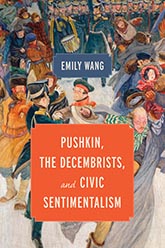|
Pushkin, the Decembrists, and Civic Sentimentalism
Emily Wang
Publications of the Wisconsin Center for Pushkin Studies
David M. Bethea, Series Editor
“Emily Wang's concept of ‘civic sentimentalism’ is an exciting and novel interpretative framework for a puzzling period in Russian literature and culture. Her engaging book gives us an entirely new understanding of Decembrism and the literary works associated with it.”
—Joe Peschio, author of The Poetics of Impudence and Intimacy in the Age of Pushkin
In December 1825, a group of liberal aristocrats, officers, and thinkers mounted a coup against the tsarist government of Russia. Inspired partially by the democratic revolutions in the United States and France, the Decembrist revolt was unsuccessful; however, it led Russia’s civil society to new avenues of aspiration and had a lasting impact on Russian culture and politics. Many writers belonged to the conspiracy, while others, including the poet Alexander Pushkin, helped inspire the uprising without directly participating in it. While the activities of the Decembrists and Pushkin’s ambiguous involvement have been well covered by historians, Emily Wang takes a novel approach, examining the emotional and literary motivations behind the movement and its dramatic, unsuccessful denouement.
Through careful readings of the literature of Pushkin and others active in the northern branch of the Decembrist movement, such as Kondraty Ryleev, Wilhelm Küchelbecker, and Fyodor Glinka, Wang traces the development of “emotional communities” among Decembrists and adjacent writers. These communities developed what Wang terms “civic sentimentalism” the belief that cultivating noble sentiments on an individual level was the key to liberal progress for Russian society. The emotional program for Decembrist community members was, in other words, also a civic program for Russia as a whole, one that they strove to enact by any means necessary. Wang argues that civic sentimentalism was a core part of Decembrist ideology, one that constituted a key difference between their pattern of thought and Pushkin’s.
Praise
“An engaging exploration of Russian Golden Age poetry that focuses on the emotional communities of Decembrist poets. Wang’s decision to foreground the history of emotions throughout the study generates a range of insightful observations about the period’s literary and cultural history.”
—Bella Grigoryan, author of Noble Subjects: The Russian Novel and the Gentry, 1762-1861
“This welcome book adds greatly to understanding of the multifaceted relationship between Pushkin and the Decembrists. . . . Highly recommended.”
—Choice Reviews
“Offers a new perspective. . . . Even those familiar with the scholarship on the subject will find new insight and provocative readings. . . . Wang’s research into both primary and secondary sources is exemplary.”
—Slavic and East European Journal
“Wang provides a fresh approach to Pushkin and the Decembrists and fosters a deeper appreciation of their impact on the emotional culture of the era.”
—The Russian Review
Table of Contents
Contents
Introduction
Chapter 1: Emotional Communities in the Age of Pushkin
Chapter 2: Love and Friendship in Decembrists Lyrics
Chapter 3: Russia’s Radical Baron—Reexamining the “Decembrist Pushkin”
Chapter 4: Ryleev, Pushkin, and the Poeticization of Russian History
Chapter 5: Civic Sentimentalism after Prison and Exile: Glinka and Batenkov
Coda: Civic Sentimentalism and the Decembrist Legacy in Leo Tolstoy’s War and Peace
Notes
Bibliography
Index
Of Related Interest
|

Tragic Encounters
Pushkin and European Romanticism
Maksim Hanukai |

Lyric Complicity
Poetry and Readers in the Golden Age of Russian Literature
Daria Khitrova |
|

Larger images
October 2023
224 pp. 6 x 9
|

